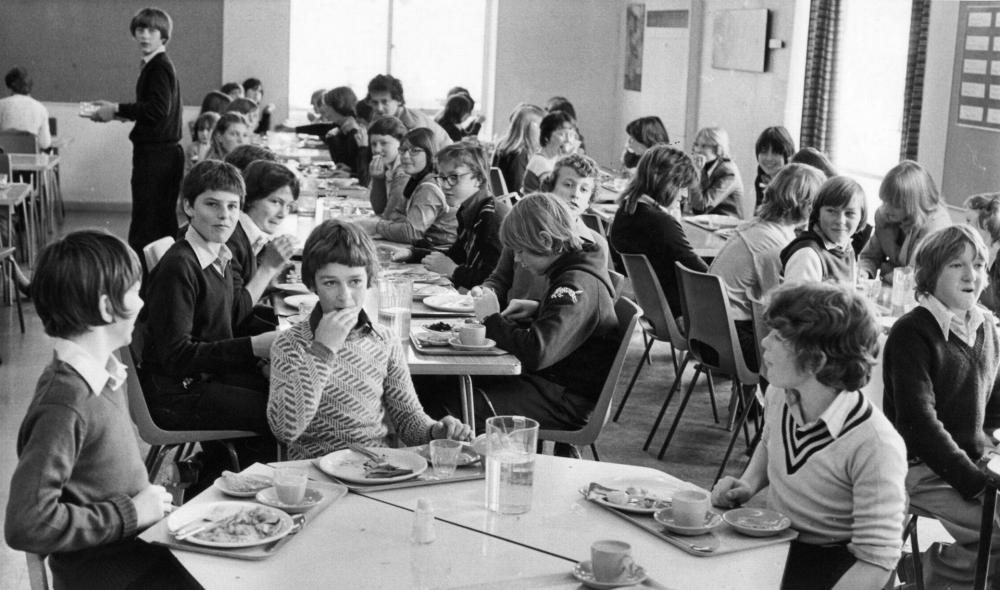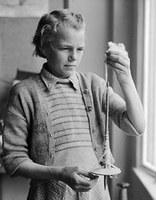Secondary Education and Social Change in the United Kingdom since 1945

School lunch on Tyneside c. 1975. Image courtesy of The Newcastle Chronicle.
Secondary Education and Social Change in the UK since 1945 was a four-year research project funded by the ESRC (Grant reference number RG88322), based in the Faculty of History, at the University of Cambridge. It was led by Professor Peter Mandler with two full-time Research Associates, Dr Chris Jeppesen and Dr Laura Carter. It remains in place on an extended basis while the team writes up its collective monograph, tentatively entitled ‘A Nation at School: The Experience of Universal Secondary Education in the UK since 1945’.

Introduction to the project
The 1944 Education (Butler) Act overhauled the structure of British education. For the first time secondary schooling became a mass experience, which would have an impact upon the life course of successive generations growing-up in late 20th century Britain. By 1961 3.2 million pupils were being educated in state funded secondary schools, and over 600,000 in the independent sector. Over the ensuing 50 years, educational reform has repeatedly divided political and popular opinion as successive governments have attempted to remodel the system.
Yet while this narrative of political meddling has been exhaustively told, we know very little about what pupils and parents thought mass education was for after 1945. Reform of the system occurred against a backdrop of profound social and economic transformation across British society. Traditional social structures appeared to fragment as processes including affluence, social mobility, a decline in deference, individualism and consumerism reconfigured how individuals understood their position within wider society.
The project uses quantitative as well as qualitative material from the birth-cohort studies, other social surveys, school and local authority archives and oral histories to track the effects that universal secondary education - suddenly achieved after the Second World War - had on the individual life course, career aspirations and achievements, and the experiences and identities of specific communities. Rather than relying entirely on ‘expert voices’ – politicians, commentators or teachers – we ask how the everyday experience of education shapes and reflects pupils’ and parents’ aspirations, expectations, and sense of self, across their lives from youth to employment to parenthood.
Our findings will combine a broad national overview with a series of local case-studies to root the experience of education within specific contexts. Unlike previous studies, our research looks beyond England and Wales to consider the whole of Britain and the complete spectrum of schools (secondary modern, grammar, comprehensive and independent). The project hopes to put education back into our understanding of modern British social history, as one of the crucibles of identity and experience across the life-course, not for some but the whole of the population.
Next steps
- For the most up-to-date information on our project have a look at our website, which includes an interactive timeline, downloadable resources, and a regularly updated blog which you can subscribe to. Over time we will be adding more features to the website including a database of archives, interactive maps, and a series of podcasts featuring conversations about individual experiences of education. We are keen to collaborate with members of the public to gather material and personal memories
- The team will be conducting research in a wide variety of archives across the UK. Using the original data and interview transcripts from postwar longitudinal studies and post-1950 social surveys, we will explore the intersection of national, regional, local and individual histories of education, charting how these differed across the UK and changed over time
- As the project progresses, we will undertake a series of oral history interviews and workshops with schools around the country
Project partners
We will be working with the following organisations to help us connect our research to different audiences:
The support of the Economic and Social Research Council (ESRC) is gratefully acknowledged.
